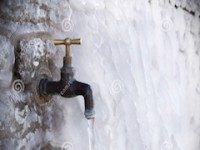The winter weather can be harsh on your home if it is not prepared. Fact. From frozen pipes to cracked gutters, the repairs could mean dipping into your savings for hundreds of pounds which could be avoided by taking a few minor precautions.
Keep Your Walkways Gritted During Snow and Ice
As well as turning your garden path into an ice rink the day after snow has fallen, ice is one of the main reasons concrete develops cracks over the years. Water enters the cracks in the concrete and expands upon freezing, forcing that hairline crack wider and wider throughout time, which unfortunately, is unavoidable. Invest in some grit/brown rock salt to keep yourself safe and also to hopefully slow the freeze/thaw process down as much as possible.
Clear Your Guttering
As with concrete, your gutters are susceptible to damage from water continuously freezing, thawing and expanding. Make sure your gutters are clear of any leaves, larges chunks of snow or any other kind of debris that may be blocking the flow of water.
Prevent Your Pipes from Freezing
Freezing pipes is common in many households. Depending on your budget, there are several ways to try and prevent this from happening. Installing pipe insulation tends to be very effective (lagging, as it may otherwise be known) and can usually be picked up for around £1 a metre. Most professionals advise, however, to simply keep your property warm and to run each cold tap in your home very gently for a few seconds a day in order to keep the water flowing.
Check Your Home Insurance
Things will go wrong or break from time to time in your home. It happens to everyone. That’s why it’s vitally important to make sure you have the right home insurance plan in place to make sure you’re covered from all angles. Review your plan from time to time and shop around for the best deal online.
Know How to Turn Your Water Off in Emergencies
In case of a burst pipe, make sure you know how to turn off your cold water supply. This is controlled by the stopcock in your home. Your stopcock is most likely located underneath your kitchen sink but it may be placed somewhere else in your home. If you’re unsure, consult a plumbing professional or if you’re in rented accommodation, consult your landlord.




